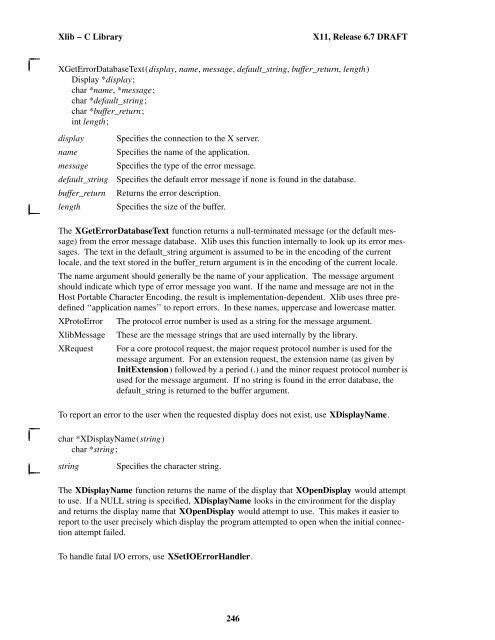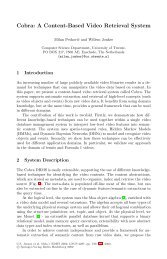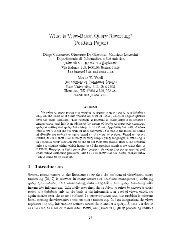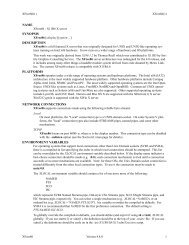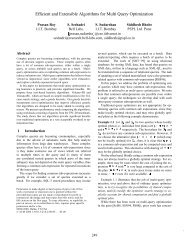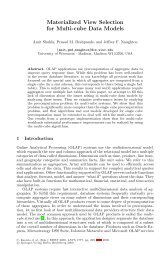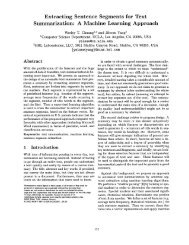- Page 3 and 4:
AcknowledgmentsThe design and imple
- Page 5 and 6:
Release 6Stephen Gildea (X Consorti
- Page 7 and 8:
Xlib − C LibraryX11, Release 6.7
- Page 9 and 10:
Xlib − C LibraryX11, Release 6.7
- Page 11 and 12:
Xlib − C LibraryX11, Release 6.7
- Page 13 and 14:
Xlib − C LibraryX11, Release 6.7
- Page 15 and 16:
Xlib − C LibraryX11, Release 6.7
- Page 17 and 18:
Xlib − C LibraryX11, Release 6.7
- Page 19 and 20:
Xlib − C LibraryX11, Release 6.7
- Page 21 and 22:
Xlib − C LibraryX11, Release 6.7
- Page 23 and 24:
Xlib − C LibraryX11, Release 6.7
- Page 25 and 26:
Xlib − C LibraryX11, Release 6.7
- Page 27 and 28:
Xlib − C LibraryX11, Release 6.7
- Page 29 and 30:
Xlib − C LibraryX11, Release 6.7
- Page 31 and 32:
Xlib − C LibraryX11, Release 6.7
- Page 33 and 34:
Xlib − C LibraryX11, Release 6.7
- Page 35 and 36:
Xlib − C LibraryX11, Release 6.7
- Page 37 and 38:
Xlib − C LibraryX11, Release 6.7
- Page 39 and 40:
Xlib − C LibraryX11, Release 6.7
- Page 41 and 42:
Xlib − C LibraryX11, Release 6.7
- Page 43 and 44:
Xlib − C LibraryX11, Release 6.7
- Page 45 and 46:
Xlib − C LibraryX11, Release 6.7
- Page 47 and 48:
Xlib − C LibraryX11, Release 6.7
- Page 49 and 50:
Xlib − C LibraryX11, Release 6.7
- Page 51 and 52:
Xlib − C LibraryX11, Release 6.7
- Page 53 and 54:
Xlib − C LibraryX11, Release 6.7
- Page 55 and 56:
Xlib − C LibraryX11, Release 6.7
- Page 57 and 58:
Xlib − C LibraryX11, Release 6.7
- Page 59 and 60:
Xlib − C LibraryX11, Release 6.7
- Page 61 and 62:
Xlib − C LibraryX11, Release 6.7
- Page 63 and 64:
Xlib − C LibraryX11, Release 6.7
- Page 65 and 66:
Xlib − C LibraryX11, Release 6.7
- Page 67 and 68:
Xlib − C LibraryX11, Release 6.7
- Page 69 and 70:
Xlib − C LibraryX11, Release 6.7
- Page 71 and 72:
Xlib − C LibraryX11, Release 6.7
- Page 73 and 74:
Xlib − C LibraryX11, Release 6.7
- Page 75 and 76:
Xlib − C LibraryX11, Release 6.7
- Page 77 and 78:
Xlib − C LibraryX11, Release 6.7
- Page 79 and 80:
Xlib − C LibraryX11, Release 6.7
- Page 81 and 82:
Xlib − C LibraryX11, Release 6.7
- Page 83 and 84:
Xlib − C LibraryX11, Release 6.7
- Page 85 and 86:
Xlib − C LibraryX11, Release 6.7
- Page 87 and 88:
Xlib − C LibraryX11, Release 6.7
- Page 89 and 90:
Xlib − C LibraryX11, Release 6.7
- Page 91 and 92:
Xlib − C LibraryX11, Release 6.7
- Page 93 and 94:
Xlib − C LibraryX11, Release 6.7
- Page 95 and 96:
Xlib − C LibraryX11, Release 6.7
- Page 97 and 98:
Xlib − C LibraryX11, Release 6.7
- Page 99 and 100:
Xlib − C LibraryX11, Release 6.7
- Page 101 and 102:
Xlib − C LibraryX11, Release 6.7
- Page 103 and 104:
Xlib − C LibraryX11, Release 6.7
- Page 105 and 106:
Xlib − C LibraryX11, Release 6.7
- Page 107 and 108:
Xlib − C LibraryX11, Release 6.7
- Page 109 and 110:
Xlib − C LibraryX11, Release 6.7
- Page 111 and 112:
Xlib − C LibraryX11, Release 6.7
- Page 113 and 114:
Xlib − C LibraryX11, Release 6.7
- Page 115 and 116:
Xlib − C LibraryX11, Release 6.7
- Page 117 and 118:
Xlib − C LibraryX11, Release 6.7
- Page 119 and 120:
Xlib − C LibraryX11, Release 6.7
- Page 121 and 122:
Xlib − C LibraryX11, Release 6.7
- Page 123 and 124:
Xlib − C LibraryX11, Release 6.7
- Page 125 and 126:
Xlib − C LibraryX11, Release 6.7
- Page 127 and 128:
Xlib − C LibraryX11, Release 6.7
- Page 129 and 130:
Xlib − C LibraryX11, Release 6.7
- Page 131 and 132:
Xlib − C LibraryX11, Release 6.7
- Page 133 and 134:
Xlib − C LibraryX11, Release 6.7
- Page 135 and 136:
Xlib − C LibraryX11, Release 6.7
- Page 137 and 138:
Xlib − C LibraryX11, Release 6.7
- Page 139 and 140:
Xlib − C LibraryX11, Release 6.7
- Page 141 and 142:
Xlib − C LibraryX11, Release 6.7
- Page 143 and 144:
Xlib − C LibraryX11, Release 6.7
- Page 145 and 146:
Xlib − C LibraryX11, Release 6.7
- Page 147 and 148:
Xlib − C LibraryX11, Release 6.7
- Page 149 and 150:
Xlib − C LibraryX11, Release 6.7
- Page 151 and 152:
Xlib − C LibraryX11, Release 6.7
- Page 153 and 154:
Xlib − C LibraryX11, Release 6.7
- Page 155 and 156:
Xlib − C LibraryX11, Release 6.7
- Page 157 and 158:
Xlib − C LibraryX11, Release 6.7
- Page 159 and 160:
Xlib − C LibraryX11, Release 6.7
- Page 161 and 162:
Xlib − C LibraryX11, Release 6.7
- Page 163 and 164:
Xlib − C LibraryX11, Release 6.7
- Page 165 and 166:
Xlib − C LibraryX11, Release 6.7
- Page 167 and 168:
Xlib − C LibraryX11, Release 6.7
- Page 169 and 170:
Xlib − C LibraryX11, Release 6.7
- Page 171 and 172:
Xlib − C LibraryX11, Release 6.7
- Page 173 and 174:
Xlib − C LibraryX11, Release 6.7
- Page 175 and 176:
Xlib − C LibraryX11, Release 6.7
- Page 177 and 178:
Xlib − C LibraryX11, Release 6.7
- Page 179 and 180:
Xlib − C LibraryX11, Release 6.7
- Page 181 and 182:
Xlib − C LibraryX11, Release 6.7
- Page 183 and 184:
Xlib − C LibraryX11, Release 6.7
- Page 185 and 186:
Xlib − C LibraryX11, Release 6.7
- Page 187 and 188:
Xlib − C LibraryX11, Release 6.7
- Page 189 and 190:
Xlib − C LibraryX11, Release 6.7
- Page 191 and 192:
Xlib − C LibraryX11, Release 6.7
- Page 193 and 194:
Xlib − C LibraryX11, Release 6.7
- Page 195 and 196:
Xlib − C LibraryX11, Release 6.7
- Page 197 and 198:
Xlib − C LibraryX11, Release 6.7
- Page 199 and 200: Xlib − C LibraryX11, Release 6.7
- Page 201 and 202: Xlib − C LibraryX11, Release 6.7
- Page 203 and 204: Xlib − C LibraryX11, Release 6.7
- Page 205 and 206: Xlib − C LibraryX11, Release 6.7
- Page 207 and 208: Xlib − C LibraryX11, Release 6.7
- Page 209 and 210: Xlib − C LibraryX11, Release 6.7
- Page 211 and 212: Xlib − C LibraryX11, Release 6.7
- Page 213 and 214: Xlib − C LibraryX11, Release 6.7
- Page 215 and 216: Xlib − C LibraryX11, Release 6.7
- Page 217 and 218: Xlib − C LibraryX11, Release 6.7
- Page 219 and 220: Xlib − C LibraryX11, Release 6.7
- Page 221 and 222: Xlib − C LibraryX11, Release 6.7
- Page 223 and 224: Xlib − C LibraryX11, Release 6.7
- Page 225 and 226: Xlib − C LibraryX11, Release 6.7
- Page 227 and 228: Xlib − C LibraryX11, Release 6.7
- Page 229 and 230: Xlib − C LibraryX11, Release 6.7
- Page 231 and 232: Xlib − C LibraryX11, Release 6.7
- Page 233 and 234: Xlib − C LibraryX11, Release 6.7
- Page 235 and 236: Xlib − C LibraryX11, Release 6.7
- Page 237 and 238: Xlib − C LibraryX11, Release 6.7
- Page 239 and 240: Xlib − C LibraryX11, Release 6.7
- Page 241 and 242: Xlib − C LibraryX11, Release 6.7
- Page 243 and 244: Xlib − C LibraryX11, Release 6.7
- Page 245 and 246: Xlib − C LibraryX11, Release 6.7
- Page 247 and 248: Xlib − C LibraryX11, Release 6.7
- Page 249: Xlib − C LibraryX11, Release 6.7
- Page 253 and 254: Xlib − C LibraryX11, Release 6.7
- Page 255 and 256: Xlib − C LibraryX11, Release 6.7
- Page 257 and 258: Xlib − C LibraryX11, Release 6.7
- Page 259 and 260: Xlib − C LibraryX11, Release 6.7
- Page 261 and 262: Xlib − C LibraryX11, Release 6.7
- Page 263 and 264: Xlib − C LibraryX11, Release 6.7
- Page 265 and 266: Xlib − C LibraryX11, Release 6.7
- Page 267 and 268: Xlib − C LibraryX11, Release 6.7
- Page 269 and 270: Xlib − C LibraryX11, Release 6.7
- Page 271 and 272: Xlib − C LibraryX11, Release 6.7
- Page 273 and 274: Xlib − C LibraryX11, Release 6.7
- Page 275 and 276: Xlib − C LibraryX11, Release 6.7
- Page 277 and 278: Xlib − C LibraryX11, Release 6.7
- Page 279 and 280: Xlib − C LibraryX11, Release 6.7
- Page 281 and 282: Xlib − C LibraryX11, Release 6.7
- Page 283 and 284: Xlib − C LibraryX11, Release 6.7
- Page 285 and 286: Xlib − C LibraryX11, Release 6.7
- Page 287 and 288: Xlib − C LibraryX11, Release 6.7
- Page 289 and 290: Xlib − C LibraryX11, Release 6.7
- Page 291 and 292: Xlib − C LibraryX11, Release 6.7
- Page 293 and 294: Xlib − C LibraryX11, Release 6.7
- Page 295 and 296: Xlib − C LibraryX11, Release 6.7
- Page 297 and 298: Xlib − C LibraryX11, Release 6.7
- Page 299 and 300: Xlib − C LibraryX11, Release 6.7
- Page 301 and 302:
Xlib − C LibraryX11, Release 6.7
- Page 303 and 304:
Xlib − C LibraryX11, Release 6.7
- Page 305 and 306:
Xlib − C LibraryX11, Release 6.7
- Page 307 and 308:
Xlib − C LibraryX11, Release 6.7
- Page 309 and 310:
Xlib − C LibraryX11, Release 6.7
- Page 311 and 312:
Xlib − C LibraryX11, Release 6.7
- Page 313 and 314:
Xlib − C LibraryX11, Release 6.7
- Page 315 and 316:
Xlib − C LibraryX11, Release 6.7
- Page 317 and 318:
Xlib − C LibraryX11, Release 6.7
- Page 319 and 320:
Xlib − C LibraryX11, Release 6.7
- Page 321 and 322:
Xlib − C LibraryX11, Release 6.7
- Page 323 and 324:
Xlib − C LibraryX11, Release 6.7
- Page 325 and 326:
Xlib − C LibraryX11, Release 6.7
- Page 327 and 328:
Xlib − C LibraryX11, Release 6.7
- Page 329 and 330:
Xlib − C LibraryX11, Release 6.7
- Page 331 and 332:
Xlib − C LibraryX11, Release 6.7
- Page 333 and 334:
Xlib − C LibraryX11, Release 6.7
- Page 335 and 336:
Xlib − C LibraryX11, Release 6.7
- Page 337 and 338:
Xlib − C LibraryX11, Release 6.7
- Page 339 and 340:
Xlib − C LibraryX11, Release 6.7
- Page 341 and 342:
Xlib − C LibraryX11, Release 6.7
- Page 343 and 344:
Xlib − C LibraryX11, Release 6.7
- Page 345 and 346:
Xlib − C LibraryX11, Release 6.7
- Page 347 and 348:
Xlib − C LibraryX11, Release 6.7
- Page 349 and 350:
Xlib − C LibraryX11, Release 6.7
- Page 351 and 352:
Xlib − C LibraryX11, Release 6.7
- Page 353 and 354:
Xlib − C LibraryX11, Release 6.7
- Page 355 and 356:
Xlib − C LibraryX11, Release 6.7
- Page 357 and 358:
Xlib − C LibraryX11, Release 6.7
- Page 359 and 360:
Xlib − C LibraryX11, Release 6.7
- Page 361 and 362:
Xlib − C LibraryX11, Release 6.7
- Page 363 and 364:
Xlib − C LibraryX11, Release 6.7
- Page 365 and 366:
Xlib − C LibraryX11, Release 6.7
- Page 367 and 368:
Xlib − C LibraryX11, Release 6.7
- Page 369 and 370:
Xlib − C LibraryX11, Release 6.7
- Page 371 and 372:
Xlib − C LibraryX11, Release 6.7
- Page 373 and 374:
Xlib − C LibraryX11, Release 6.7
- Page 375 and 376:
Xlib − C LibraryX11, Release 6.7
- Page 377 and 378:
Xlib − C LibraryX11, Release 6.7
- Page 379 and 380:
Xlib − C LibraryX11, Release 6.7
- Page 381 and 382:
Xlib − C LibraryX11, Release 6.7
- Page 383 and 384:
Xlib − C LibraryX11, Release 6.7
- Page 385 and 386:
Xlib − C LibraryX11, Release 6.7
- Page 387 and 388:
Xlib − C LibraryX11, Release 6.7
- Page 389 and 390:
Xlib − C LibraryX11, Release 6.7
- Page 391 and 392:
Xlib − C LibraryX11, Release 6.7
- Page 393 and 394:
Xlib − C LibraryX11, Release 6.7
- Page 395 and 396:
Xlib − C LibraryX11, Release 6.7
- Page 397 and 398:
Xlib − C LibraryX11, Release 6.7
- Page 399 and 400:
Xlib − C LibraryX11, Release 6.7
- Page 401 and 402:
Xlib − C LibraryX11, Release 6.7
- Page 403 and 404:
Xlib − C LibraryX11, Release 6.7
- Page 405 and 406:
Xlib − C LibraryX11, Release 6.7
- Page 407 and 408:
Xlib − C LibraryX11, Release 6.7
- Page 409 and 410:
Xlib − C LibraryX11, Release 6.7
- Page 411 and 412:
Xlib − C LibraryX11, Release 6.7
- Page 413 and 414:
Xlib − C LibraryX11, Release 6.7
- Page 415 and 416:
Xlib − C LibraryX11, Release 6.7
- Page 417 and 418:
Xlib − C LibraryX11, Release 6.7
- Page 419 and 420:
Xlib − C LibraryX11, Release 6.7
- Page 421 and 422:
Xlib − C LibraryX11, Release 6.7
- Page 423 and 424:
Xlib − C LibraryX11, Release 6.7
- Page 425 and 426:
Xlib − C LibraryX11, Release 6.7
- Page 427 and 428:
Xlib − C LibraryX11, Release 6.7
- Page 429 and 430:
Xlib − C LibraryX11, Release 6.7
- Page 431 and 432:
Xlib − C LibraryX11, Release 6.7
- Page 433 and 434:
Xlib − C LibraryX11, Release 6.7
- Page 435 and 436:
Xlib − C LibraryX11, Release 6.7
- Page 437 and 438:
Xlib − C LibraryX11, Release 6.7
- Page 439 and 440:
Xlib − C LibraryX11, Release 6.7
- Page 441 and 442:
Xlib − C LibraryX11, Release 6.7
- Page 443 and 444:
Xlib − C LibraryX11, Release 6.7
- Page 445 and 446:
Xlib − C LibraryX11, Release 6.7
- Page 447 and 448:
Xlib − C LibraryX11, Release 6.7
- Page 449 and 450:
Xlib − C LibraryX11, Release 6.7
- Page 451 and 452:
Xlib − C LibraryX11, Release 6.7
- Page 453 and 454:
Xlib − C LibraryX11, Release 6.7
- Page 455 and 456:
Xlib − C LibraryX11, Release 6.7
- Page 457 and 458:
Xlib − C LibraryX11, Release 6.7
- Page 459 and 460:
Xlib − C LibraryX11, Release 6.7
- Page 461 and 462:
Xlib − C LibraryX11, Release 6.7
- Page 463 and 464:
Xlib − C LibraryX11, Release 6.7
- Page 465 and 466:
Xlib − C LibraryX11, Release 6.7
- Page 467 and 468:
Xlib − C LibraryX11, Release 6.7
- Page 469 and 470:
Xlib − C LibraryX11, Release 6.7
- Page 471 and 472:
Xlib − C LibraryX11, Release 6.7
- Page 473 and 474:
Xlib − C LibraryX11, Release 6.7
- Page 475 and 476:
Xlib − C LibraryX11, Release 6.7
- Page 477 and 478:
Xlib − C LibraryX11, Release 6.7
- Page 479 and 480:
Xlib − C LibraryX11, Release 6.7
- Page 481 and 482:
Xlib − C LibraryX11, Release 6.7
- Page 483 and 484:
Xlib − C LibraryX11, Release 6.7
- Page 485 and 486:
Xlib − C LibraryX11, Release 6.7
- Page 487 and 488:
Xlib − C LibraryX11, Release 6.7
- Page 489 and 490:
Xlib − C LibraryX11, Release 6.7
- Page 491 and 492:
Xlib − C LibraryX11, Release 6.7
- Page 493 and 494:
Xlib − C LibraryX11, Release 6.7
- Page 495 and 496:
4.2. Translating Screen Coordinates
- Page 497 and 498:
10.7. Input Focus Events . . . . .
- Page 499 and 500:
13.5.6.1. Input Style . . . . . . .


